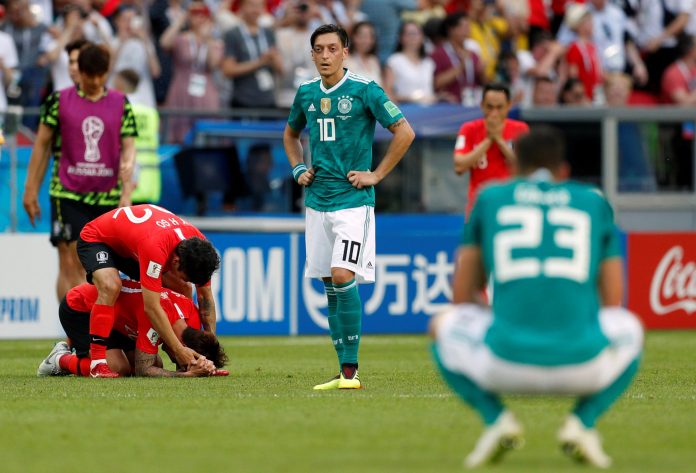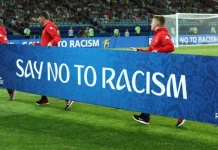Germany is facing scrutiny over its suitability to host the UEFA European Football Championship amid allegations of discriminatory practices in the participation process. Moreover, issues have arisen regarding the inclusivity and fair treatment of athletes and groups from diverse backgrounds. The controversy casts a shadow over their ability to uphold the value of games. More than half of the Black population in Germany has encountered racism at least once, and nearly one-fifth of Black women report facing threats or harassment multiple times annually
In the UEFA European Football Championship when discrimination occurs in participation its impact goes beyond the championship to other societal implications. The UEFA European Football Championship is a highly regarded football tournament, held every four years organizing nations from across Europe to engage in a sports, cultural, and unity event. However, when discrimination gets mixed with these principles, then it distorts this event and makes it have a negative aspect.
Effect on Athletes and Teams
It occasionally refers to justice inequality in participation in terms of race, ethnic background, nationality, sex, or gender identity. This work also sought to determine the barriers discrimination poses to athletes or teams when competing. It means that when athletes or teams are discriminated against their abilities to compete on an equal level are hindered. Moreover, it impacts their employment opportunities and contributes to the continuation of inequity within the sport. After World War II, East and West Germany competed separately in the Olympics.
The East German team, known for its state-sponsored doping program, engaged in widespread cheating and unethical behavior. Female swimmers from East Germany, in particular, set more than 10 world records and secured 22 out of 26 gold medals in 1976 and 1980 as a result of this doping program. In this case, the unfair treatment entails decision-making on gender, marital status, nationality, qualification, experience, or any other demographical factor that must not determine the success of an athlete.
Social and Cultural Issues
If we go beyond the sports perspective, the UEFA European Football Championship carries great cultural and social values. Thus, it plays the role of amplifying tolerance, receptiveness, and respect towards other countries. Discrimination thus erodes these values, as it sends a clear message that members of one’s race, religion, gender, or orientation, or anyone else of that description, are not wanted or are of lesser value in society.
Germany may also contribute to negative stereotyping and exacerbation of social cleavages. All these problems are acting as a barrier to the attainment of society’s diverse and inclusive vision. The Nazi regime in Germany utilized the 1936 Berlin Olympics as a platform to promote their racist ideology, although the success of African American athletes such as Jesse Owens somewhat countered these efforts.
Organizational Responsibility
Organizers of major events such as the UEFA European Football Champion must respect the principles of diversity and equality of all the players. However, Germany fails to fulfill these requirements. They must prohibit discrimination practices based on race, disability, gender, or any other factors and encourage diversity within the context of the event. This involves matters like facilities, media, and treatment for fans to encourage everyone to embrace diversity and be treated with equal respect. Approximately 14% of Muslim women and 13% of Asian women in Germany reported incidents of threats or harassment based on their race or ethnicity.
Media and public perception
The media play a key role in shaping the public perception of activities. Coverage that highlights discrimination or inequality will have a profound effect on how an event is perceived globally. The negative publicity now not only hurts the popularity of the event, but also reflects badly on the host country and the participating teams. Therefore, it doesn’t seem that Germany is fit to host UEFA European Football Champion.
Legal and ethical aspects
Criminal offenses and discrimination in sporting opportunities may violate national and international legal guidelines that protect people from unfair happening. Organizers need to navigate these legal frameworks carefully to ensure some compliance and mitigate crime-challenging situations. However, looking at the track record of Germany, fairness will never come into the picture. The 1972 Munich Olympics were tragically marred by a hostage crisis in which Palestinian terrorists took hostage and ultimately killed 11 members of the Israeli team.
From an ethical perspective, the promotion of diversity and inclusion should be a fundamental principle guiding the planning and implementation of such activities. The integrity of the event is at risk, while discriminatory practices affect the manner of participation. Football, as a sport that celebrates skill and teamwork, must offer equal opportunities to all certified athletes and groups regardless of their background.
Economic and sponsorship implications
Discrimination could have financial implications, affecting sponsorship deals, ticket sales, and tourism sales associated with the match. Sponsors and investors are increasingly favoring institutions for opportunities that align with their values of inclusiveness and social responsibility.
In addition, tarnished popularity due to discriminatory practices can lead to monetary losses and long-term damage to the business viability of the opportunity. Women continue to be underrepresented in coaching and managerial positions in sports, accounting for only about 20% of top decision-making roles in EU sports federations. When discrimination occurs, it undermines the fairness of the competition, calls into question the legitimacy of the effects, and reduces the credibility of the tournament.
Conclusion
In conclusion, discrimination in major sports activities such as the UEFA European Football Championship undermines sportsmanship, fair play, and more. It has a bad influence on athletes and teams, but additionally reflects broader societal attitudes closer to diversity and equality. Organizers, stakeholders, and enthusiasts must work together to sell a culture of appreciation and inclusion.
However, Germany fails to uphold the image of such a big and important event. They must ensure that every member has an equal opportunity to compete and contribute to the success of the event. As Germany is not tackling discriminatory practices head-on and embracing scale, it will bring a lot more problems in the future. The UEFA European Football Championship can act as an effective catalyst for beneficial social trade on a global scale if handled well.













